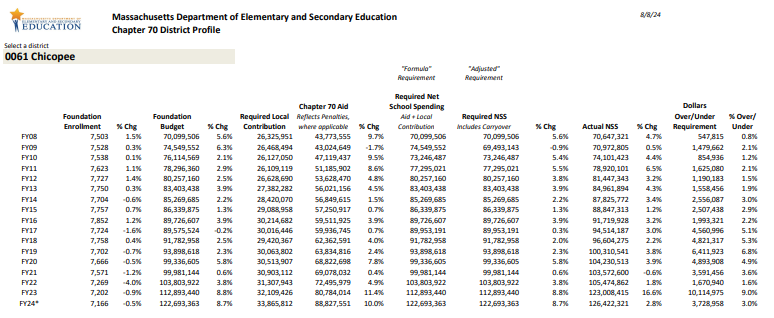Understanding Massachusetts Chapter 70 Funding for Public Schools
Explaining how school funding works in Massachusetts.
LEARNING
McCarthy for CPS
3/14/20252 min read


What is Chapter 70 Funding?
In Massachusetts, Chapter 70 funding is a crucial piece of legislation designed to support public schools across the state. Enacted in 1993, this funding mechanism ensures that school districts receive the necessary financial resources to provide quality education to their students. The funding formula aims to account for various factors such as local property wealth, student enrollment, and specific needs related to low-income students. By doing so, it seeks to address disparities in educational funding and promote equity in education.
You can learn more here: https://www.doe.mass.edu/finance/chapter70/fy2026/preliminary.html
Also, the Student Opportunity Act is important to understand as it amended portions of Chapter 70 and follows 3-year cycles for funding and meeting milestones.
How Does Chapter 70 Work?
At its core, Chapter 70 funding works by distributing state funds to school districts based on a formula that considers the educational costs required to adequately serve students. This formula includes a base amount determined by the number of students enrolled in a district, adjusted for local resources and specific needs. For instance, districts with a higher number of economically disadvantaged students may receive more funding to provide additional support and services. This strategic allocation aids in leveling the playing field for all students, especially in communities that are less financially advantaged.
Chicopee has received about 60-70% of our school funding from the state based on this formula.
The Impact of Chapter 70 Funding
The impact of Chapter 70 cannot be overstated. By providing a steady stream of funding, it allows schools to maintain essential programs, hire qualified teachers, and invest in necessary classroom resources. For many districts, Chapter 70 funds constitute a significant portion of their budgets, directly influencing the quality of education students receive. Additionally, the funding promotes transparency and accountability, as school districts are required to report how they utilize these funds to support educational goals.
Moreover, the funding has evolved, with periodic updates and refinements to the formula to better meet the changing needs of students and communities. Legislators continue to recognize the importance of equitable funding and are committed to improving and maintaining the Chapter 70 program. This ongoing support exemplifies the state’s dedication to ensuring that every child, regardless of their background, has access to a high-quality education.
In summary, Massachusetts Chapter 70 represents a significant effort to balance educational funding among school districts across the state. Its well-thought-out formula aims to ensure that all students have the resources they need to thrive in their educational journeys. With continuous evaluations and adaptations, the Chapter 70 funding mechanism is poised to remain a vital component of Massachusetts' commitment to education.
Mark D. McCarthy, Ph.D.
Consulting and Professional Services
Insight. Equity. Literacy.
Connect
contact@mccarthycps.org
413-206-9896
© 2026 McCarthy Consulting and Professional Services. All rights reserved.